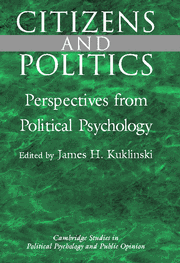Book contents
- Frontmatter
- Contents
- List of Contributors
- Prologue: Political Psychology and the Study of Citizens and Politics
- PART I AFFECT AND EMOTIONS
- PART II POLITICAL COGNITION
- PART III POLITICAL ATTITUDES AND PERCEPTIONS
- PART IV POLITICAL VALUES
- Introduction
- 13 Social Welfare Attitudes and the Humanitarian Sensibility
- 14 American Individualism Reconsidered
- 15 Political Value Judgments
- 16 Commentary: The Study of Values
- 17 Commentary: The Value of Politics
- Index
- Titles in the series
14 - American Individualism Reconsidered
Published online by Cambridge University Press: 07 October 2011
- Frontmatter
- Contents
- List of Contributors
- Prologue: Political Psychology and the Study of Citizens and Politics
- PART I AFFECT AND EMOTIONS
- PART II POLITICAL COGNITION
- PART III POLITICAL ATTITUDES AND PERCEPTIONS
- PART IV POLITICAL VALUES
- Introduction
- 13 Social Welfare Attitudes and the Humanitarian Sensibility
- 14 American Individualism Reconsidered
- 15 Political Value Judgments
- 16 Commentary: The Study of Values
- 17 Commentary: The Value of Politics
- Index
- Titles in the series
Summary
INTRODUCTION
Forty years of research in political psychology indicates that most Americans most of the time do not deduce their issue attitudes or assessments of political leaders from enduring ideological principles such as liberalism, conservatism, libertarianism, or socialism (Converse, 1964; Kinder, 1983; Neuman, 1986). That this is bad news is not at all self-evident (Barber, 1988; Marcus, 1988), and more than one author has praised the American public for its practical, nonideological approach to politics (e.g., Bell, 1960; Dionne, 1991, ch. 13; Lipset, 1960). Even if citizens are generally nonideological, however, even if they may tend to favor “whatever works,” one is still left with the question: “works in terms of what?” That is, what standards or criteria do Americans employ when deciding whether one policy or candidate works better than another?
Borrowing from their colleagues in economics, the rational-choice school of political science would have us believe that the primary (some would claim the only) criterion that matters in making political judgments is self-interest (see, e.g., Downs, 1957; Riker and Ordeshook, 1973). Of course, the definition of what constitutes self-interest can be (and has been) stretched to explain pretty much anything – donating anonymously to a charity, bearing and raising children, even volunteering for dangerous combat duty.
- Type
- Chapter
- Information
- Citizens and PoliticsPerspectives from Political Psychology, pp. 401 - 432Publisher: Cambridge University PressPrint publication year: 2001
- 20
- Cited by



